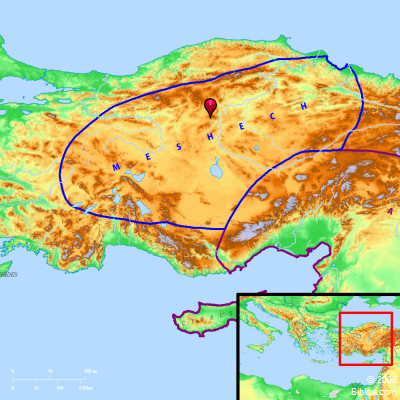Atlas  Meshech and surrounding region Maps Created using Biblemapper 3.0 Additional data from OpenBible.info Occurrences Ezekiel 27:13 Javan, Tubal, and Meshech, they were your traffickers; they traded the persons of men and vessels of brass for your merchandise.Ezekiel 38:2 Son of man, set your face toward Gog, of the land of Magog, the prince of Rosh, Meshech, and Tubal, and prophesy against him, Ezekiel 38:3 and say, Thus says the Lord Yahweh: Behold, I am against you, Gog, prince of Rosh, Meshech, and Tubal: Ezekiel 39:1 You, son of man, prophesy against Gog, and say, Thus says the Lord Yahweh: Behold, I am against you, Gog, prince of Rosh, Meshech, and Tubal: Encyclopedia MESHECH; MESECHme'-shek, me'-sek (meshekh, "long," "tall"; Mosoch): Son of Japheth (Genesis 10:2 1 Chronicles 1:5; 1 Chronicles 1:17 is a scribal error for "Mash"; compare Genesis 10:22, 23). His descendants and their dwelling-place (probably somewhere in the neighborhood of armenia (Herodotus iii.94)) seem to be regarded in Scripture as synonyms for the barbaric and remote (Psalm 120:5; compare Isaiah 66:19, where Meshech should be read instead of "that draw the bow"). It is thought that the "Tibareni and Moschi" of the classical writers refer to the same people. Doubtless they appear in the annals of Assyria as enemies of that country under the names Tabali and Mushki-the latter the descendants of Meshech and the former those of Tubal to whom the term "Tibareni" may refer in the clause above. This juxtaposition of names is in harmony with practically every appearance of the word in Scripture. It is seldom named without some one of the others-Tubal, Javan, Gog and Magog. It is this which forms a good justification for making the suggested change in Isaiah 66:19, where Meshech would be in the usual company of Tubal and Javan. Ezekiel mentions them several times, first, as engaged in contributing to the trade of Tyre (Tiras of Genesis 10:2 ?), in "vessels of brass" and-very significantly-slaves; again there is the association of Javan and Tubal with them (Ezekiel 27:13); second, they are included in his weird picture of the under-world: "them that go down into the pit" (Ezekiel 32:18, 26). They are mentioned again with Gog and Magog twice as those against whom the prophet is to "set his face" (Ezekiel 38:2, 3; Ezekiel 39:1). |



